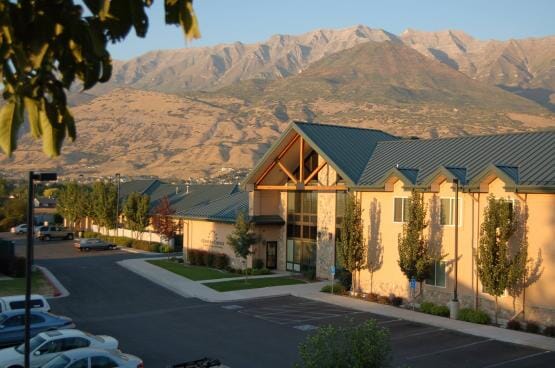Center for Change is a treatment center specializing in helping women and adolescent girls struggling with eating disorders and related, co-occurring behavioral health issues, including substance abuse. Treatment options follow the 12-step model and include individual and group therapy, addiction education, life skills training and relapse prevention skills.
ABOUT CENTER FOR CHANGE
Located 45 miles south of Salt Lake City, tucked below the Wasatch Mountains in Orem, Utah, Center for Change offers residential and outpatient treatment services for adults and adolescents struggling with eating disorders. Treatment for co-occurring disorders, such as depression, anxiety, and substance abuse, is provided on a case-by-case basis. The residential program is for women only, but men can participate in the outpatient program.
TREATMENT & ASSESSMENT
Center for Change distinguishes itself as being the first eating disorder treatment program to fully implement an intuitive eating recovery model. This method teaches clients how to gradually normalize their relationship with food by learning how to trust their bodies and get in touch with their hunger signals.
All treatment plans are highly individualized, and length of stay varies depending on each client, although residential stays are typically three to seven months for adults and four to fifteen months for adolescents.
After an initial assessment, clients with moderate suicide risk, co-occurring substance abuse issues, or serious medical issues are admitted to an acute inpatient stabilization unit. At this stage, adolescents and adults receive treatment together. Clients who have already engaged in an outpatient program but need immediate medical and/or psychiatric assistance will also be enrolled in the short-term inpatient unit.
Once stabilized, clients enter the residential program, where programming for teens (ages 13 to 17) is separate from adults. Both groups participate in individual counseling and family therapy, as well as one-on-one sessions with a registered dietitian twice per week.
Regular group therapy sessions include therapy techniques such as dialectical behavioral therapy (DBT), cognitive behavioral therapy (CBT), supervised eating, nutrition education, and several groups including an Art R.T. Group and a Body Image Group. Clients also participate in semiweekly 12-step meetings, and balance & awareness groups.
Medications are prescribed, if necessary, and a week-long family program, where families learn how to best support their loved one, is held each month. The facility follows up with graduates for up to five years after treatment. Other aftercare options include alumni activities and an intensive three-day workshop.
STAFF CREDENTIALS
The center’s treatment team consists of medical doctors, psychiatrists, and psychiatric nurses, as well as registered dietitians, licensed master’s level or Ph.D. level therapists, experiential therapists, and care technicians.
ACCOMMODATIONS & AMENITIES
In the 56,000-square-foot clinic, women live in comfortable, dorm-like rooms with one roommate. Each room either has a private bathroom or shares one with an adjacent room.
Exercise is permitted once clients are medically/psychologically cleared for it, and the facility offers a therapeutic activity called RIMBA (i.e. Reconnecting Intuitive Movement with Balanced Awareness), which is a yoga-based practice designed for eating disorder recovery.
WHAT ALUMNI SAY
Two alumni polled by Best-rehabs.com to date rated Center for Change with mixed-to-high ratings, recommending it with 3.5 out of five stars, rating its staff’s level of experience and training and its cleanliness 4.5 out of five stars, yet its affordability only two stars. While alum S.K. admitted the program “despite its weaknesses, is the only one that helped,” alum K.B. criticized the facility’s high price and location in a Mormon community, which was “negative for some clients.”
On Google, seven reviewers rated Center for Change on average four out of five stars to date, with five five-star reviews, one two-star, and one one-star review.[1] While the five-star reviewers spoke favorably of their or their loved ones’ experiences at the facility, alum Baileigh felt she was “treated like a criminal” despite writing that “the center has wonderful staff who work there!”
WHAT STAFF SAY
The only former staff member polled by Best-rehabs.com awarded four- and five-star ratings to the facility. The reviewer applauded the center for including families in the recovery process, and added: “I’ve seen so many people learn how to cope with PTSD, depression, anxiety and overcome their eating disorders through the Center for Change!”
FINANCING
Center for Change is in-network with some insurance providers, and accepts out-of-network coverage from others. Private payment is also accepted, and for those who have no insurance at all, discounts are available, though the center does not offer a sliding fee scale. TRICARE for military personnel and family is accepted. Fees do not cover the cost of medication, lab work, or external consultations.
[1]
